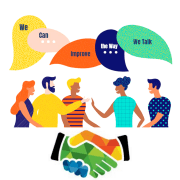7 Reasons to Learn a New Language
WHY STUDY ANOTHER LANGUAGE?
AND WHY STUDY ITALIAN OR SPANISH?
1. Connect!
One of the most rewarding aspects of the human experience is our ability to connect with others. Being able to communicate with someone in his or her language is an incredible gift. Bilinguals have the unique opportunity to communicate with a wider range of people in their personal and professional lives.
2. Advance Your Career
Language skills can be a significant competitive advantage that sets you apart from your monolingual peers. Learning a second language also opens additional doors to opportunities for studying or working abroad.
3. Feed Your Brain
The many cognitive benefits of learning languages  are undeniable. People who speak more than one language have improved memory, problem-solving and critical-thinking skills, enhanced concentration, ability to multitask, and better listening skills. They switch between competing tasks and monitor changes in their environment more easily than monolinguals, as well as display signs of greater creativity and flexibility. If that weren’t enough, as we age, being bilingual or multilingual also helps to stave off mental aging and cognitive decline.
are undeniable. People who speak more than one language have improved memory, problem-solving and critical-thinking skills, enhanced concentration, ability to multitask, and better listening skills. They switch between competing tasks and monitor changes in their environment more easily than monolinguals, as well as display signs of greater creativity and flexibility. If that weren’t enough, as we age, being bilingual or multilingual also helps to stave off mental aging and cognitive decline.
4. Deepen Your Connection to Other Cultures
Language is the most direct connection to other cultures. Being able to communicate in another language exposes us to and fosters an appreciation for the traditions, religions, arts, and history of the people associated with that language.
5. See the World
Traveling as a speaker of the local language can revolutionize a trip abroad. While monolingual travelers are capable of visiting the same places, travelers who know more than one language are more easily able to navigate outside the tourist bubble and to connect and interact with the place and its people in a way that is often inaccessible to those without the language.
6. Boost Your Confidence
Any language learner can attest to making his or her share of mistakes while discovering a new language—often in front of an audience. It’s a necessary part of the learning process! Learning a language means putting yourself out there and moving out of your comfort zone. The upside is the amazing sense of accomplishment you’ll feel when conversing with someone in their native language.
7. Gain Perspective
As we explore a new language and culture, we naturally draw comparisons to what is most familiar. Learning about another culture sheds light on aspects of our own culture—both positive and negative—we may not have previously considered. You may find a greater appreciation for what you have, or you may decide to shake things up!










Leave a Reply
Want to join the discussion?Feel free to contribute!